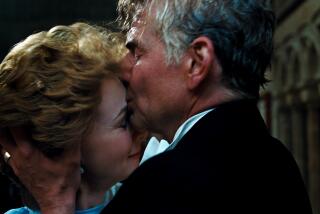‘Sunday’ Fable Balances the Bizarre, Poignant
- Share via
In Adam Bernstein’s darkly comic “Six Ways to Sunday,” “White Heat” meets “Psycho” with ‘90s candor as a crazed woman’s extreme possessiveness propels her 18-year-old son into a life of crime. In adapting Charles Perry’s 1962 novel “Portrait of a Young Man Drowning,” Bernstein reveals a sure sense of control of outrageous material, allowing his film to be simultaneously and alternately serious and comic without either element undermining the other. The result is a deft entertainment for those who like their movies low-budget, noirish and risky.
From the first shot, you sense that the past will hang heavily over the film’s key figures. That shot is of an austere old brick row house in Youngstown, Ohio, in the heart of America’s Rust Belt. The house is the drab, dingy home to a middle-aged single mother, Kate Odum (Deborah Harry), a still-beautiful woman who never fixes her hair and lives in her bathrobe. Yet she is nevertheless the seductive parent to her virginal son Harry (Norman Reedus), at the same time warning him that “all girls are sluts.” Meanwhile, Harry, who works as a fry cook, in a city whose steel mills once offered a good livelihood to blue-collar workers, one day tags along with his childhood pal Arnie (Adrien Brody), who’s collecting a delinquent debt from a strip joint owner for a local gangster, the avuncular but steely Louis Varga (Jerry Adler). The impact of a bar full of topless dancers sparks a frustrated, violent response in Harry, in whom Varga immediately sees a comer.
Harry becomes part of a tightly knit underworld that rewards him with warm camaraderie but in return expects him to turn hit man on demand. Harry thrives as a daring criminal, while his Oedipal relationship with his mother persists, rendering him impotent.
*
Bernstein unravels the plot twists and turns without losing his balance between the bloody and the bizarre, the droll and the poignant. “Six Ways to Sunday” is a fable speculating on the relationship between sex and violence, and it is kept afloat by a raft of risk-taking performances, especially on the part of Reedus and Harry. Brody, Peter Appel as the ruthless Varga’s deadly yet sentimental second-in-command, Holter Graham as Harry’s sleek imaginary alter ego Madden and Isaac Hayes as a crooked cop all help anchor “Six Ways” to reality. But nothing is more real or more crucial to making the film remain convincing through mind-boggling developments than the faded grandeur of Youngstown itself--abetted by some New York and New Jersey locales--a place of derelict factories and magnificent but grimy Beaux-Arts buildings at its core, all of them captured on film as effectively as the people themselves by John Inwood’s camera, which is as expressive as Theresa Mastropierro’s knowing production design.
* MPAA rating: R, for graphic bloody violence, strong sexuality and brief drug use. Times guidelines: The film is wholly unsuitable for children even if accompanied by adults.
‘Six Ways to Sunday’
Norman Reedus: Harry Odum
Deborah Harry: Kate Odum
Peter Appel: Abie (The Bug) Pinkwise
Elina Lowensohn: Iris
Adrien Brody: Arnie Finklestein
A Stratosphere Entertainment release of a Jonathan Demme presentation. Director Adam Bernstein. Producers Bernstein, David Collins, Michael Naughton. Executive producer Charles Johnson. Screenplay by Bernstein. Based upon the Charles Perry novel “Portrait of a Young Man Drowning.” Cinematographer John Inwood. Editor Doug Abel. Music Theodore Shapiro. Production designer Theresa Mastropierro. Running time: 1 hour, 35 minutes.
Exclusively at the Los Feliz 3, 1822 N. Vermont Ave., Hollywood, (323) 664-2169, and the University, Campus Drive, opposite UCI, Irvine, (949) 854-8811 or (714) 777-FILM (No. 084).
More to Read
Only good movies
Get the Indie Focus newsletter, Mark Olsen's weekly guide to the world of cinema.
You may occasionally receive promotional content from the Los Angeles Times.









